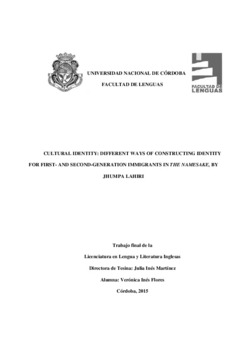| dc.description.abstract | Various cultural studies and social theories have analyzed the concept of cultural identity from different perspectives. On one end of the spectrum, there is essentialism, which asserts that there exist some objective traits of particular groups of people that are inherent, eternal, and unalterable, determined prior to the individual based on their shared history. On the other end, there are non-essentialist theories, which consider culture as a construction, as not being fixed, but movable and in constant change due to the relations with others. For this study, I will approach the concept of identity from a non-essentialist point of view because, as Kathryn Woodward, Professor of Sociology at the Open University (United Kingdom), states, when adopting a non-essentialist position regarding identity, identities are fluid, have different elements which can be reconstructed in new cultural conditions, and are not fixed essences locked into differences which are permanent for all time (1997, p. 29). If we understand cultural identity in this way, it will not surprise us that, for example, a person who was born in India (or to an Indian family) and who holds an American passport may retain elements from both cultures and may not feel locked into one single cultural identity.
Immigrants’ experiences in their quest for identity and their construction of a hybrid identity have awakened the interest of many researchers, who have attempted to analyze this phenomenon to gain a better understanding of modern social behaviors. As well as theorists, many post-colonial writers have described these hybrid identities in their fictional works, as in many cases they themselves have hyphenated nationalities2 and they write from their own experience as minority subjects in another country. Literature, as a product of culture, sheds light on crucial issues of contemporary society. | es |





